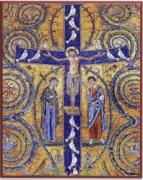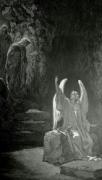Have you ever read an inspiring quote from someone whose beliefs or morals or character you abhorred? It might be a deep insight into human nature by someone like Chairman Mao. Or it might be an edifying thought from a God-mocking atheist.
Reading such quotes leaves one with a mixed feeling. You like the quote. You do not like the source of the quote. How do you process your reaction?
I had that mixed feeling recently when reading a quote from Nietzsche. He wrote, “Whoever fights monsters should see to it that in the process he does not become a monster.”
It’s a great quote and a great reminder, despite its source. But I’m not one to say “As Nietzsche wrote” during one of my talks. I would have to say, “As even Nietzsche recognized . . . .”
So, the quote is edifying, but not the source.
I had that mixed feeling – in this case, very deeply mixed – when hearing a quote from Adolph Hitler about courage. Hitler? What could such a despicable human being possibly say that could be edifying or helpful? Anyone but Hitler!
What made matters worse was the fact that Hitler’s attitude rebuked the cowardice of many who are on the right side of issues but refuse to stand for fear of consequences. Could a demonized human being like Hitler have something to say to them? Even to think such a thought shocks the system.
Now, I have not been able to verify this quote in other sources, but I heard it for the first time while watching the first episode of the 2008 documentary Hitler’s Bodyguard.
The episode opens with these words: “Adolf Hitler caused the death of 50 million people.”
While some would put the estimate a little lower, either way, the numbers are almost incomprehensible. And how many did Hitler directly murder?
Yet, despite more than 40 attempts on his life, Hitler was never assassinated.
Not only so, but despite Hitler’s paranoia and his legions of bodyguards, he would often stand erect in his car when saluting the crowds. Wouldn’t it be safer to sit down and be less visible?
According to the documentary, Hitler explained, “As there can be no absolute security against fanatics, I always make a point of standing upright in my car. The world belongs to the brave. If some assassin wishes to shoot me or blow me up with a bomb, I am no safer sitting down than standing up.”
Again, I have not been able to locate the source of this quote. But if it is accurate, it is a real rebuke to moral cowardice – and it comes from a man who is the epitome of evil, the incarnation of wickedness. Talked about having mixed feelings when reading a quote.
Yet what Hitler said was true, even if he lived by lies. Yes, “The world belongs to the brave.”
Really now, how many cowards have been worldchangers? Conversely, how many effective leaders have been spineless?
How many double-minded, wavering people have inspired us? And who wants to follow a fear-filled commander?
As the Christian author C. H. Mackintosh (1820-1896) said, “A coward heart will not do for the day of battle; a doubting spirit will not stand in conflict.”
So true!
The Lord even says this in the book of Revelation: “I am the Alpha and the Omega, the Beginning and the End. To the thirsty I will give water without cost from the spring of the water of life. Those who are victorious will inherit all this, and I will be their God and they will be my children. But the cowardly, the unbelieving, the vile, the murderers, the sexually immoral, those who practice magic arts, the idolaters and all liars—they will be consigned to the fiery lake of burning sulfur. This is the second death” (Revelation 21:6-8, my emphasis).
As explained by the Greek scholar Ceslas Spicq, “When Rev 21:8 places the fainthearted [i.e., cowardly] and the unbelieving in the lake of fire, it has in view Christians during times of persecution who, out of a fear of suffering, renounce their faith. It is a commonplace that human courage and cowardice are revealed in the face of death.”
For those of us who choose convenience over courage and comfort over conviction, not only does the Bible rebuke us, from beginning to end. And not only do the great leaders of the centuries rebuke us, especially those who gave their lives for a cause. But one of the vilest human beings who ever lived rebukes us.
That is sobering indeed.


























